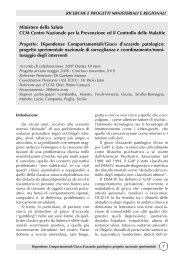Gaining health : analysis of policy development in European ...
Gaining health : analysis of policy development in European ...
Gaining health : analysis of policy development in European ...
You also want an ePaper? Increase the reach of your titles
YUMPU automatically turns print PDFs into web optimized ePapers that Google loves.
Chapter 4<br />
50<br />
private donation. There are now 12 regional cancer societies<br />
and 4 patient organizations with over 140 000 <strong>in</strong>dividual<br />
members.<br />
The F<strong>in</strong>nish Cancer Organizations, which <strong>in</strong>cludes the<br />
orig<strong>in</strong>al society, the F<strong>in</strong>nish Cancer Registry, the Cancer<br />
Foundation, the Foundation for Cancer Research and the<br />
Foundation for the F<strong>in</strong>nish Cancer Institute, is now one <strong>of</strong><br />
the largest public <strong>health</strong> organizations <strong>in</strong> the country.<br />
Efforts orig<strong>in</strong>ally concentrated primarily on help<strong>in</strong>g poor<br />
cancer patients, <strong>in</strong>clud<strong>in</strong>g the runn<strong>in</strong>g <strong>of</strong> seven hospitals,<br />
later transferred to the public sector. Attention shifted <strong>in</strong><br />
the 1960s to patient organizations and the F<strong>in</strong>nish Foundation<br />
for Cancer Research was founded <strong>in</strong> 1969. The Cancer<br />
Society was one <strong>of</strong> the driv<strong>in</strong>g forces <strong>in</strong> the nationwide<br />
antismok<strong>in</strong>g campaign.<br />
By the 1970s, NGOs and public authorities were already<br />
work<strong>in</strong>g together <strong>in</strong> national work<strong>in</strong>g groups to develop<br />
cancer control programmes. The F<strong>in</strong>nish Cancer Registry<br />
provided valuable epidemiological data for this purpose.<br />
Hospice and palliative care ga<strong>in</strong>ed ground <strong>in</strong> the 1980s. By<br />
the 1990s, <strong>health</strong> promotion campaigns had been modernized<br />
and emphasis was placed on evaluat<strong>in</strong>g the quality and<br />
effectiveness <strong>of</strong> various screen<strong>in</strong>g methods, so that only<br />
screen<strong>in</strong>g shown to be effective would be funded.<br />
Cancer control is considered to be mostly well-planned and<br />
well-implemented, and <strong>development</strong>s <strong>in</strong> the reduction <strong>of</strong><br />
cervical and breast cancer have been very good (30). Of<br />
the EU countries, F<strong>in</strong>land now has the lowest death rate<br />
for all cancers <strong>in</strong> the population aged 0–64 years. There<br />
is some concern, however, that scientific results are not<br />
always taken <strong>in</strong>to account quickly enough <strong>in</strong> the plann<strong>in</strong>g<br />
process.<br />
2.4.3. Mental <strong>health</strong><br />
F<strong>in</strong>land, like most countries, has a long history <strong>of</strong> isolated<br />
mental hospitals located away from urban <strong>development</strong>s.<br />
The mental <strong>health</strong> legislation <strong>of</strong> the 1950s led to a doubl<strong>in</strong>g<br />
<strong>of</strong> these <strong>in</strong>stitutions, so that by the early 1970s F<strong>in</strong>land and<br />
Sweden were among the countries with the highest bed<br />
ratios for mental patients <strong>in</strong> the world (over 4 beds per<br />
1000 population). About 50% <strong>of</strong> these <strong>in</strong>stitutions were<br />
new, built dur<strong>in</strong>g the previous 20 years, but they were not<br />
easily accessible. The stigma associated with mental illness<br />
was still strong.<br />
By the late 1960s and early 1970s, many <strong>in</strong>dustrialized<br />
countries were question<strong>in</strong>g such <strong>in</strong>stitutionalized care. New<br />
drugs made possible new ways <strong>of</strong> provid<strong>in</strong>g treatment outside<br />
<strong>in</strong>stitutions. The WHO Regional Office for Europe was<br />
among the early advocates for rais<strong>in</strong>g public <strong>health</strong> <strong>in</strong>terest<br />
<strong>in</strong> mental <strong>health</strong> services <strong>in</strong> the Member States.<br />
In late 1970s, the National Board <strong>of</strong> Health published an<br />
expert report and recommendations for the <strong>development</strong><br />
<strong>of</strong> mental <strong>health</strong> services, <strong>in</strong>clud<strong>in</strong>g proposals for disease<br />
prevention and mental <strong>health</strong> promotion. The epidemiological<br />
analyses carried out, and the evaluation <strong>of</strong> exist<strong>in</strong>g<br />
mental <strong>health</strong> <strong>in</strong>stitutions, <strong>in</strong>dicated a need for only 0.6<br />
beds per 1000 population for <strong>in</strong>stitution-based psychiatric<br />
care. In fact, two thirds <strong>of</strong> the exist<strong>in</strong>g beds were be<strong>in</strong>g<br />
used for non-psychiatric patients, <strong>in</strong>clud<strong>in</strong>g chronically ill<br />
older people <strong>in</strong> need <strong>of</strong> good basic somatic care, social support<br />
and hous<strong>in</strong>g. This report formed the basis for mental<br />
<strong>health</strong> policies for the next few decades.<br />
When PHC was totally reorganized through the 1972<br />
Public Health Act, however, mental <strong>health</strong> services were<br />
not <strong>in</strong>cluded. To compensate for the lack <strong>of</strong> a mental <strong>health</strong><br />
component <strong>in</strong> primary care, a new role for psychologists<br />
was developed. They were given the task <strong>of</strong> promot<strong>in</strong>g<br />
mental <strong>health</strong> <strong>in</strong> schools and day-care centres together with<br />
Case studies: <strong>policy</strong> <strong>development</strong> <strong>in</strong> countries for tackl<strong>in</strong>g noncommunicable diseases

















